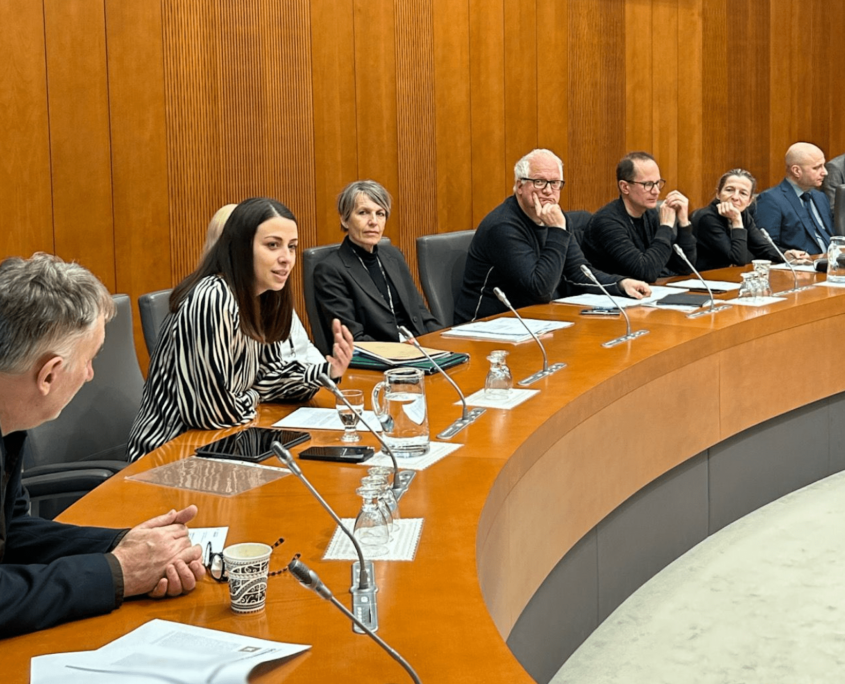On Monday, 27 February 2023, MEP Irena Joveva attended a meeting of the Committee on Culture of the National Assembly to discuss the (non-)use of the Slovenian language on online digital platforms and operating systems in Slovenia. The members of the Committee unanimously adopted a resolution supporting the MEP’s efforts and welcomed the envisaged amendments to the Public Use of the Slovenian Language Act. The MEP began her speech on a personal note, stressing in particular that all companies present on the Slovenian and, by extension, the EU market must respect our country and our language.
Joveva began by explaining what moved her to take action: “Full sorry. These are practically the only two words in the English language that my father knows – or understands. /…/ I can see his desire to keep up with the times, which translates into keeping in touch as easily as possible not only with me, but with people in general, with civilisation. And what good do these two English words do him, if he wants to keep up with the times and watch something on Netflix, for example? Or watch Disney+ cartoons with his granddaughter? Or, why not, buy an Apple product? Basically, all I can say to him is, again, ‘full sorry’, but you just can’t have or watch that. Or you can watch it, as a matter of fact, but you won’t understand it. Full sorry.”
Next, Joveva took a broader perspective, because it is not only about the elderly, people who do not speak foreign languages, it is also about young people, and primarily about the deaf, the hard of hearing, the blind, the visually impaired… Therefore, the MEP launched the Po slovensko, hvala (In Slovenian: Hvala) initiative, by first sending public letters to the CEOs of certain companies.
“I can watch Netflix, Amazon prime, Disney+, I can own all kinds of Apple devices and have no problems understanding or using them. But – why should any of us have to settle for the fact that we can’t use them in our mother tongue?”
Joveva emphasised that in the future the transition to the digital world will be even more significant and that foreign language skills are always welcome. Still, discrimination of languages by multinationals is accompanied by many negative consequences. She pointed to the degradation of the standard Slovenian language and added that offering Slovenian in the digital world would not least financially support local translators and demonstrate the companies’ respect for the language, culture and country in which they operate.
“Language is a living thing, but that doesn’t mean we shouldn’t care if it is not respected. /…/ If a company comes to offer its content or products on the Slovenian market, and, by extension, on the European Union market, it must respect the language of that market. Slovenian is an official language of the European Union. It doesn’t matter whether we are talking about the physical or digital world, there shouldn’t be any difference on that account.”
 Even if people decided not to use these companies’ services out of protest, this would not solve anything, believes Joveva: “It is my right and my choice to use my mother tongue in my home country.”
Even if people decided not to use these companies’ services out of protest, this would not solve anything, believes Joveva: “It is my right and my choice to use my mother tongue in my home country.”
She called for unity and reminded the participants that the Public Use of the Slovenian Language Act is outdated and flawed, and hopes, therefore, that the basis for the amendment to the Act, which is being prepared by the competent ministry and which, according to them, will soon be presented for public debate, will be good.
She furthermore referred to the EU Audiovisual Media Services Directive, which prohibits discrimination but fails to explicitly mention discrimination based on language. She announced that this will be noted in the forthcoming report on the implementation of the directive, which is to be adopted by the European Parliament’s Committee on Culture in the near future. As examples of good practice, the MEP cited other languages with fewer speakers, such as Icelandic, Basque, Catalan and Galician, which have managed to achieve presence and equality in the digital world. She also said that there were foreign companies in Slovenia that do offer their content in Slovene.
“The (small) size of a market does not justify discrimination of a language and culture. If companies refuse to accept this freely, it will have to be dealt with differently. There is no need for us to simply be grateful that these service providers are present on our market. Of course, it’s good that they are, but they need to respect Slovenia and the Slovenian language.”
She also explained that she had already had meetings with some company representatives, but they had made it very clear that they had no plans to extend their offer to Slovenian in the near future: “Because they don’t have to. Because there is no pressure on them to do so, as there is no legislation to that effect. So, the solution is at hand.”
“Before anyone says: But then all these companies will leave Slovenia, is that really what we want, to drive companies out … Do you know what they said to me about that? That they always act in accordance with the law and that they have never left a country before. So, once again, the solution is at hand.”
The meeting was also attended by representatives of the Ministry of Culture, the Slovenian Language Service at the Ministry of Culture, the Culture and Media Inspectorate, the Fran Ramovš Institute of the Slovenian Language at the Slovenian Academy of Sciences and Arts, the Commission for the Slovenian Language in Public Use at the Slovenian Academy of Sciences and Arts, and the Slovenian Chamber of Culture.
The Committee on Culture adopted the following decisions with 12 votes in favour and none against:
- The Committee on Culture supports the efforts of the Ministry of Culture and MEP Irena Joveva and other individuals representing institutions to ensure that Slovenian, being one of the official languages of the European Union, is used on Apple devices and operating systems and on streaming media services provided by Amazon Prime, Disney+ and Netflix, which do not offer subtitles and dubbing in Slovenian.
- The Committee on Culture proposes that the Committee on Culture and Education of the European Parliament, within its remit, address the problem of the inaccessibility of all the official languages of the European Union’s Single Market and propose solutions to the European institutions.





Leave a Reply
Want to join the discussion?Feel free to contribute!